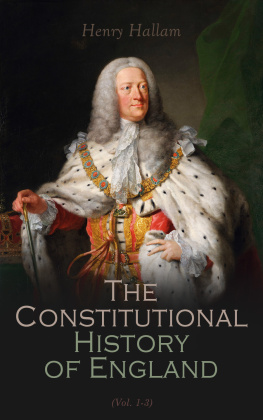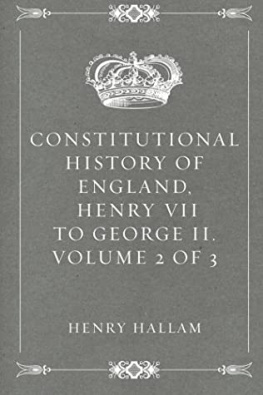INTRODUCTION
Table of Contents
Few historical works have stood the test of time better than Hallam's Constitutional History. It was written nearly a century agothe first edition was published in 1827and at a time when historians were nothing if not stout party men. The science of history, as we now know it, was in its infancy; apologetics were preferred to exegesis; the study of "sources," the editing of texts, the classification of authorities were almost unknown. History was regarded as the handmaid of politics, and the duty of the historian was conceived as being, in the language of Macaulay, the impression of "general truths" upon his generation as to the art of government and the progress of society. Whig and Tory, Erastian and High Churchman, debated on the field of history. The characters of Laud and Cromwell excited as much passion and recrimination as if they were contemporary politicians. That a history written in such times, and by a writer who was proud to call himself a Whig, should still hold its place is not a little remarkable. The reason for its vitality is to be found in the temperament and training of the author. Hallam was a lawyer in the sense in which that term is used at the Bar; that is to say, not so much a seductive advocate as a man deeply versed in the law, accurate, judicious, and impartial. Macaulay, who was as much the advocate as Hallam is the judge, described the Constitutional History as "the most impartial book we ever read," and the tribute was not undeserved. Hallam is often didactic, but he is never partisan. Although a Whig he was by no means concerned, like Macaulay, to prove that the Whigs were never in the wrong, and, as he shrewdly remarks, in his examination of the tenets of the two great parties in the eighteenth century: "It is one thing to prefer the Whig principles, another to justify, as an advocate, the party which bore that name." No better illustration of his attitude of mind can be found than the passage in which, treating of the outbreak of hostilities between Charles I. and the Long Parliament, he sets himself to consider "whether a thoroughly upright and enlightened man would rather have listed under the royal or the parliamentary standard." In these days when, as the distinguished occupant of the chair of Modern History at Cambridge tells us, "history has nothing to do with morality," Hallam's grave anxiety to solve this problem may sound quaint and, indeed, irrelevant; but there is no denying the high purpose, the sincerity, and the passion for truth which characterise the passage in question. To-day the historian's conception of truth is purely objective: his aim is to discover what former generations thought rather than to concern himself with what we should think of them. The late Lord Acton stood almost alone among the modern school of historians in insisting that it is the duty of the historian to uphold "the authority of conscience" and "that moral standard which the powers of earth and religion itself tend constantly to depress." It is more fashionable to contend that the moral standard is relative; that we cannot judge the men of the past by the ethical rules of the present; that conscience itself is the product of historical development. It may be questioned whether this scepticism has not been carried too far. Hallam had no such doubts. For him "the thoroughly upright and enlightened man" of the seventeenth century was not intrinsically different from the thoroughly upright and enlightened man of the nineteenth; the one concession he makes to time is that the historian is probably in a better, not a worse, position to judge than the men of whom he writesif only because he is more detached. He condemns the obsequiousness of Cranmer, the bigotry of Laud, the tortuousness of Charles I., the ambition of Strafford, with the same reprobation as he would have extended to similar obliquities in a contemporary. Unless we are to exclude conduct altogether from our consideration and to deny the personal factor in history, we shall find it hard to say he is wrong. Gardiner, the latest historian of the Stuarts, does not hesitate to pronounce similar judgments, though he expresses himself more mildly. Sorel, perhaps the most illustrious of the modern school of French historians and a scholar who spent his life among the archives, has not hesitatedin writing on the Partition of Polandto speak of the Nemesis which always waits upon such "public crimes."
Hallam's predilection for moral judgments is the more intelligible if we remember that his conception of "constitutional" history is somewhat wider than ours is to-day. He included in it much that would now be called "political" history. One has only to compare his work with the latest of our authoritiesthe posthumous book of F. W. Maitlandto realise how the term has become specialised. Maitland confines his treatment to the results of political action as they are represented in the growth of institutions; with political action itself he is, unlike Hallam, not concerned. The rise and fall of parties, the issues of Parliamentary debate, the progress of political speculation interest him but little and disturb him not at all. But to Hallam these things were hardly less important than the statute book and the law reports. This liberal view of his subject is not a thing to be regretted. It enables the reader to appreciate the large part played in the development of the English constitution by those "conventions" which are a gloss upon the law and without which the constitution itself is unintelligible. As Bagehot has pointed out, the legal powers of the king are as large as his actual authority is small. In strict legal theory the cabinet is merely an informal group of ministers of the crown who hold office during the king's pleasure. In fact and in practice it is a committee of the House of Commons dependent upon the support of the majority of the members. The fact is the outcome of a conventional modification of the theory, and this convention is due to the political changes of the eighteenth century and the growth of the party system. In the pages of Hallam these changes receive their due recognition, and without it the development of the English constitution is unintelligible. It was a favourite doctrine of Hallam that so far as the law was concerned the constitution was developed very early and that all that later generations contributed to it was better administration of the law and a more vigilant public opinion. He even goes so far as to say in his chapter in the Middle Ages that he doubts "whether there are any essential privileges of our countrymen, any fundamental securities against arbitrary power, so far as they depend upon positive institutions, which may not be traced to the time of the Plantagenets." This is something of an anachronism, but it represents a not unjustifiable reaction against the high prerogative doctrines of writers of his own day. What Hallam, however, was really concerned to prove was that constitutional law in this country rests upon the common lawupon the rules laid down by medival judges as to the right of the subject to trial by jury, his immunity from arbitrary arrest, his claim not to be arbitrarily dispossessed of his property, and his right of action against the servants of the crown when he has suffered wrong. In this conception Hallam was undoubtedly right, and he urged it at a time when no one had made it as familiar as it has now become in the classic pages of Professor Dicey. But Hallam was perfectly well aware that these securities for the liberty of the subject were often abused, that the sheriffs who empanelled the jury were often corrupt and the judges who directed it were not infrequently servile; also that so long as the Star Chamber existed no jury could venture to give a verdict of "not guilty" in a prosecution by the crown without running the risk of being heavily punished. He is not insensible to these abuses and to the length of time it took to correct them, as the reader of the following pages will discover for himself, and he attaches due weight to the constitutional importance of the Act for the Abolition of the Star Chamber. But the truth of his main contention (as expressed in his chapter on "The English Constitution" in an earlier work has recently pointed this out in language almost identical with that of Hallam when he insists that "Parliaments" or "Estates" were in no way peculiar to England; every country in Western Europe possessed them in the Middle Ages, but what those countries did not possess was a great school of law like the Inns of Court determined to uphold at all costs the claims of the customary law of the nation against the despotic doctrines of the civil law of Rome.










